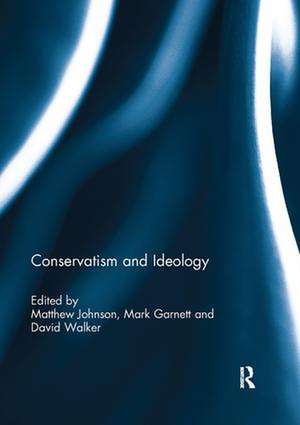Conservatism and Ideology
Editat de Matthew Johnson, Mark Garnett, David Walkeren Limba Engleză Paperback – 16 mai 2017
This book will be published as a special issue of Global Discourse.
Preț: 325.34 lei
Preț vechi: 386.78 lei
-16% Nou
Puncte Express: 488
Preț estimativ în valută:
62.26€ • 65.46$ • 51.44£
62.26€ • 65.46$ • 51.44£
Carte tipărită la comandă
Livrare economică 16-30 aprilie
Preluare comenzi: 021 569.72.76
Specificații
ISBN-13: 9781138094802
ISBN-10: 1138094803
Pagini: 198
Dimensiuni: 174 x 246 x 21 mm
Greutate: 0.45 kg
Ediția:1
Editura: Taylor & Francis
Colecția Routledge
Locul publicării:Oxford, United Kingdom
ISBN-10: 1138094803
Pagini: 198
Dimensiuni: 174 x 246 x 21 mm
Greutate: 0.45 kg
Ediția:1
Editura: Taylor & Francis
Colecția Routledge
Locul publicării:Oxford, United Kingdom
Cuprins
1. Introduction: Conservatism and ideology Matthew Johnson
2. What does it take to be a true conservative? Martin Beckstein
Reply
Identifying true conservatives: a reply to Beckstein Joseph V. Femia
3. The conservative minimum: historical and transcendent subject Doğancan Özsel
Reply
From David Hume to Sarah Palin? The troubled search for common features of political ‘conservatism’: a reply to Özsel Stuart McAnulla
4. The unconscious Indianization of ‘Western’ conservatism – is Indian conservatism a universal model? Björn Goldstein
Reply
Comment on Goldstein and conservatism in India and elsewhere Kieron O’Hara
5. ‘The weaker-willed, the craven-hearted’: the decline of One Nation Conservatism Peter Dorey and Mark Garnett
Reply
The demise of the One Nation tradition Richard Hayton
6. Neoliberalism, conservative politics, and ‘social recapitalization’ Edward Ashbee
Reply
Neoliberalism, conservative politics and ‘social recapitalization’: a reply Andrew Gamble
7. The rhetoric of neoliberalism in the politics of crisis Andrew Scott Crines
Reply
The rhetoric of neoliberalism in the politics of crisis: a reply to Andrew Scott Crines Peter Dorey
8. Government open data and transparency: Oakeshott, civil association and the general will Kieron O’Hara
Reply
Government open data and transparency: Oakeshott, civil association and the general will: a reply to O’Hara Mark Garnett
9. Book Review Symposium: Reconstructing conservatism? The Conservative Party in Opposition, 1997–2010, By Richard Hayton
Review by Mark Garnett
Reconstruction or repackaging? A review Murray Stewart Leith
Reply: The strange survival of Tory conservatism Richard Hayton
10. Book Review Symposium: The Conservatives since 1945: The Drivers of Party Change, By Tim Bale
Review by David M. Walker
Review by Jim Buller
Reply by Tim Bale
2. What does it take to be a true conservative? Martin Beckstein
Reply
Identifying true conservatives: a reply to Beckstein Joseph V. Femia
3. The conservative minimum: historical and transcendent subject Doğancan Özsel
Reply
From David Hume to Sarah Palin? The troubled search for common features of political ‘conservatism’: a reply to Özsel Stuart McAnulla
4. The unconscious Indianization of ‘Western’ conservatism – is Indian conservatism a universal model? Björn Goldstein
Reply
Comment on Goldstein and conservatism in India and elsewhere Kieron O’Hara
5. ‘The weaker-willed, the craven-hearted’: the decline of One Nation Conservatism Peter Dorey and Mark Garnett
Reply
The demise of the One Nation tradition Richard Hayton
6. Neoliberalism, conservative politics, and ‘social recapitalization’ Edward Ashbee
Reply
Neoliberalism, conservative politics and ‘social recapitalization’: a reply Andrew Gamble
7. The rhetoric of neoliberalism in the politics of crisis Andrew Scott Crines
Reply
The rhetoric of neoliberalism in the politics of crisis: a reply to Andrew Scott Crines Peter Dorey
8. Government open data and transparency: Oakeshott, civil association and the general will Kieron O’Hara
Reply
Government open data and transparency: Oakeshott, civil association and the general will: a reply to O’Hara Mark Garnett
9. Book Review Symposium: Reconstructing conservatism? The Conservative Party in Opposition, 1997–2010, By Richard Hayton
Review by Mark Garnett
Reconstruction or repackaging? A review Murray Stewart Leith
Reply: The strange survival of Tory conservatism Richard Hayton
10. Book Review Symposium: The Conservatives since 1945: The Drivers of Party Change, By Tim Bale
Review by David M. Walker
Review by Jim Buller
Reply by Tim Bale
Descriere
In what ways is conservatism developing in response to shifting electoral fortunes, financial crises and coalition government?
This book will be published as a special issue of Global Discourse.
This book will be published as a special issue of Global Discourse.
